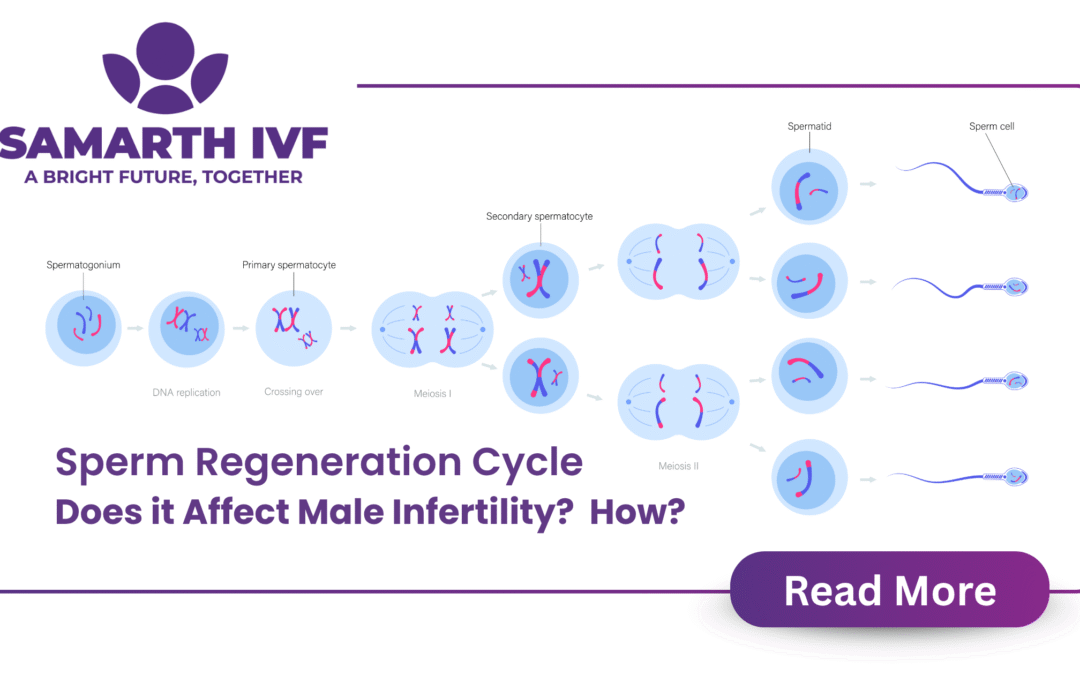In the Indian social and cultural structure, male infertility is often neglected or dishonoured by the male partner. But ideally, both partners are supposed to be screened for infertility. Male infertility ideally revolves around the sperms. The ideal sperm regeneration cycle is 74 days, from its start to reaching its final outcome. The process is known as spermatogenesis. This is a continuous process by which a male produces sperm in his testicles. The beauty of this process is that a male can produce sperms in a cyclical manner and replenish his stock. It has no restrictions like the female egg.
Let us see the stages of spermatogenesis:
- Spermatogonia (Stem Cells): Typically, it begins in the healthy testes, with a type of stem cell called spermatogonia. These cells keep dividing to create new cells, some of which will continue the process of becoming sperm.
- Spermatocytes (Meiosis): The next stage is transforming those cells into spermatocytes, which then undergo a critical process called meiosis. This is where the cell’s genetic material is halved, ensuring that when the sperm fertilizes an egg, the resulting embryo has the correct number of chromosomes.
- Spermatids (Maturation): After meiosis, the cells are now called spermatids. They are not yet ready to fertilize an egg. They undergo a process of maturation, developing the characteristic head (containing the DNA) and tail (for motility) of a mature sperm cell.
- Spermatozoa (Final Product): Once the spermatids have matured, they are now called spermatozoa—the final, motile sperm cells. These are then released into the epididymis, a coiled tube behind the testes, where they are stored and gain the final ability to swim and fertilize an egg.
The Link Between the Cycle and Infertility
Every stage of this process is crucial, and any impact at any stage results in the disruption of normal sperm formation and the inability of a male to father a child. It may affect sperm’s shape, size, number, and motility.
Factors Affecting Sperm Regeneration

Since it takes three months for the final sperm to reach maturity, any health or lifestyle issue during this time frame can affect fertility.
- Smoking & Alcohol – Reduce sperm count and motility.
- High Stress – Hormonal imbalance affects sperm production.
- Obesity & Poor Diet – Lead to poor quality sperm.
- Heat Exposure (tight clothes, hot tubs, laptop on lap) – Negatively impacts sperm formation.
- Medical Conditions like varicocele, diabetes, infections, or hormonal disorders.
What Can Be Done to Improve Sperm Health?
The best part is that the sperm regeneration cycle is a continuous process, and many improvements are possible by making positive changes. While it takes time, the effects are often significant.
- Adopt a Healthy Lifestyle: Focus on a balanced diet rich in antioxidants like drumsticks, green leafy vegetables, and fruits. Get regular exercise, do yoga, maintain a healthy weight, and limit alcohol. Quit tobacco, gutkha, smoking, and any substance abuse.
- Manage Stress: Practices like mindfulness, meditation, or even just regular physical activity can help keep stress in check.
- Consult a Specialist: If you are concerned about male infertility, a urologist or a reproductive endocrinologist can perform a thorough evaluation, including a sperm analysis and hormone tests. They can help identify specific issues and recommend targeted treatments.

Core Message
The Disproportionate Medical Risks of Multiple Pregnancy
- The sperm regeneration cycle is the foundation of male fertility. Since it takes about 3 months for new sperm to develop, any negative habits, illnesses, or exposures today can impact fertility after a few months. Understanding this cycle helps in making timely lifestyle changes and seeking medical help for infertility.
- For couples struggling with infertility, a male fertility evaluation is equally important as a female evaluation. Again, we stress—remember, fertility is a journey for both partners.

